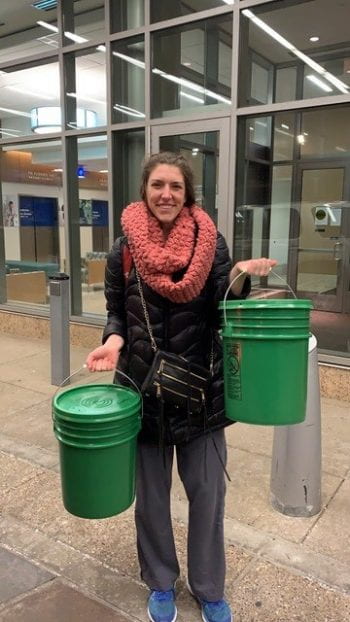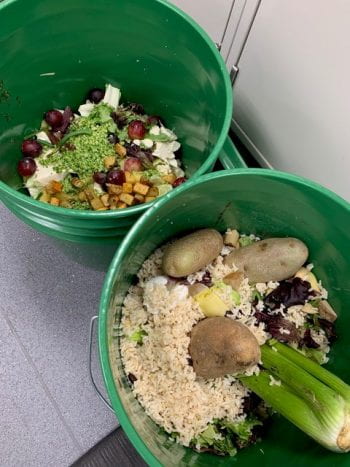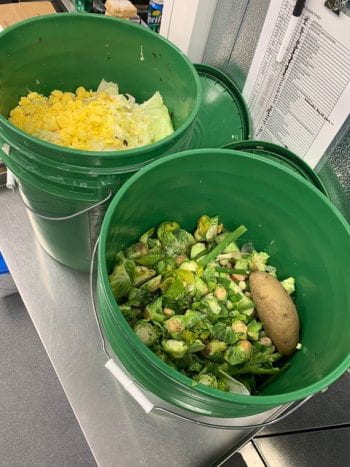“To the chickens!” is now a common phrase used in the Clinical Translational Research Unit (CTRU) Metabolic Research Kitchen. This refers to the food scraps produced by the kitchen operations that are thrown into bright green 5-gallon buckets and saved for the chickens at Howie Farms, one of the vendors from the School of Medicine Farmer’s Market.
The CTRU metabolic kitchen provides prepared food and solutions for clinical research studies conducted by many WashU School of Medicine investigators. Meals are prepared from scratch each day and frozen to be taken home and consumed by research study participants that are following study-specific meal plans. The meals recipes feature lots of vegetables and grains, generating food scraps on a daily basis that would otherwise go to the landfill. The kitchen produces around two 5-gallon buckets of food waste each week that is fed to the chickens on Thursdays. This initiative is a homerun for sustainability because it:
- Reduces landfill waste
- Provides food for chickens
- Brings ethically sourced eggs to the farmer’s market
- Promotes the consumption of healthy meals with minimally processed ingredients, which is best for human health and planetary health.
Lexi Linsenman is a Research Dietetic Assistant in the CTRU and she is passionate about food and sustainability. She collects food waste to compost for her garden at home and sees the need for composting at work, too. Linsenman is a frequent shopper at the farmers’ market. Thanks to her connection to the team in Human Resources that coordinates the market, she found this outlet for the kitchen scraps generated through their daily meal preparation. Linsenman brought this idea up to her colleagues in the kitchen, a tight knit group, who were all on board and supportive. Appreciative of the initiative, her supervisor gave her the green light to move ahead.
“I am so lucky to have team members who support me like they do! I look forward to seeing Pat and Jay [Howie] each week. They even said the chickens get excited when they see the green buckets coming!”, says Lexi Linsenman.

The School of Medicine community, and the university overall, work diligently every day to reduce its waste output through a variety of ways. One of the largest outlets for food waste is composting. Shell Café, Farmstead Café, and the catering kitchen in the Eric P. Newman Education Center all collect kitchen scraps and leftover food for composting. This process diverted over 14,000 pounds of waste just in 2018!
Post-consumer compostable waste is collected at several locations on the Danforth campus, but not at the School of Medicine at this time. Offices are encouraged to take their coffee grounds and food scraps home for composting in personal gardens where possible.
This article was co-authored by Alicia Hubert, Sustainability Coordinator for WUSM and Lexi Linsenman, Research Dietetic Assistant in the CTRU.

